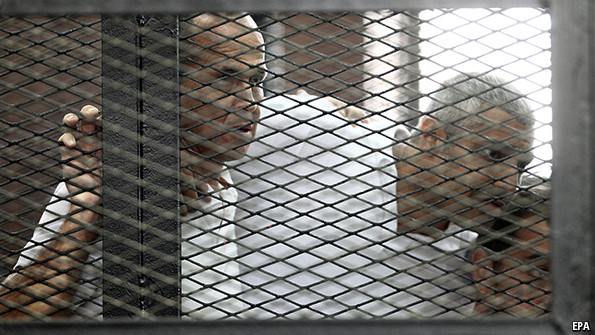
Europe’s energy independence from Russia impossible in short term – Oettinger … – ITAR
June 26, 2014
Europe needs new tools in new era, says Orbán
June 26, 2014
THE sentencing by an Egyptian court on June 23rd of six international journalists (three of them in absentia) to between seven and ten years in prison has prompted a chorus of condemnation. Human-rights groups and Western governments describe the rulings as a travesty. Yet in the increasingly Kafkaesque lottery of Egyptian justice, the harsh sentences are sadly by no means unusual.
The arrest of the three principal defendants last December and their lengthy trial contained strong elements of farce. The evidence against the men, all employees of the Al Jazeera English television network, included such things as professional editing software (held to be proof that they had “tampered” with news footage so as to besmirch Egypt’s image), video tape of a horse show, a music clip, and the family photographs of one defendant, Peter Greste, an Australian who happens to be an award-winning former BBC correspondent and had been in Egypt for only two weeks at the time of his arrest. Another defendant, Baher Muhammad, an Egyptian producer, received an extra three years beyond his colleagues’ seven-year sentences for happening to possess a single bullet that he claimed was a souvenir.
The charges against the journalists were also absurd-sounding. The three men’s most serious offence seems to have been attempting to interview members of the now-outlawed Muslim Brotherhood, a group which dominated Egypt’s parliament and government until they were ousted in a coup last year. Considering that any journalist with a mind to balanced reporting would have been delighted to air the views of Egypt’s now-persecuted underdogs, such accusations as “aiding a terrorist group”, “tarnishing Egypt’s image abroad”, “threatening national security” and “creating a terrorist media network” seemed rather wildly overblown.
The sole crime of one absentee defendant, Rena Netjes, a Dutch journalist with no association to Al Jazeera (and oddly identified in court documents as “Johanna Identity”), appears to have been daring to accept a cup of coffee during a visit to Mr Greste’s hotel. Ms Netjes wisely went into hiding at the time of her friends’ arrest, and managed to slip out of Egypt. A further 14 defendants, half of them students whose relation to the case was never made clear, the rest employees of Al Jazeera who no longer live in Egypt, were lumped together with the principal defendants. Gleefully feeding Egypt’s scare-mongering gutter press, prosecutors gleefully dubbed this supposed broader group the “Marriott Cell” after the posh Cairo hotel where the original arrests were made, painting a picture of devilish intrigue in a luxury locale.
Still, compared with many of the other legal dramas Egypt has witnessed lately, the sentencing of the journalists, which may still be appealed in a higher court, is scarcely shocking. Estimates of the number of Brotherhood members or alleged sympathisers who have been arrested in the past year—and then typically jailed for weeks or months awaiting trial—range between 16,000 and 44,000. Many of those caught up in the sweep have been unlucky bystanders during demonstrations by the Brotherhood, or people denounced by neighbours or colleagues in personal vendettas.
In recent weeks a single judge has condemned more than 1,000 alleged Brotherhood members or sympathisers, including the group’s 70-year-old Supreme Guide, Muhammad Badie, to death for the mob killing of three policemen during nationwide riots last year, following trials that lasted only a few hours. On June 21st the same judge amended his initial recommendations in one case, abruptly declaring more than 400 defendants could walk free, but affirming death sentences on 183 others. Those condemned to the scaffold include a blind man and a Coptic Christian whose family insists that he is viscerally opposed to the Muslim Brothers.
Most Egyptians appear unfazed by the darkening climate for human rights. After three years of revolutionary turmoil they want nothing more than peace and quiet, at any cost. But murmurs of disquiet are growing as the crackdown widens to criminalise a broad range of dissent. Sherine Tadros, a former colleague of the condemned Al Jazeera crew, expressed the feelings of many at the news of their sentencing. In a mournful Twitter post she said this: “As a friend I feel incredibly sad, as a journalist I’m scared, as an Egyptian I’m ashamed.”

